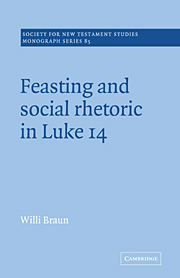Book contents
- Frontmatter
- Contents
- Acknowledgements and note on abbreviations
- 1 Introduction: how to read Luke 14?
- 2 Assumptions and preliminary reading
- 3 Jesus as a healer of craving desire (14.1–6)
- 4 Uncommon ‘symposium rules’ (14.7–11, 12–14)
- 5 The big dinner (14.15–24): aspects of Lukan performance
- 6 The conversion of a wealthy householder
- 7 Forms, genres and composition
- 8 Composition as argumentation: the rhetoric of Luke 14
- 9 Towards closure (and openings)
- Bibliography
- Indices
6 - The conversion of a wealthy householder
Published online by Cambridge University Press: 28 August 2009
- Frontmatter
- Contents
- Acknowledgements and note on abbreviations
- 1 Introduction: how to read Luke 14?
- 2 Assumptions and preliminary reading
- 3 Jesus as a healer of craving desire (14.1–6)
- 4 Uncommon ‘symposium rules’ (14.7–11, 12–14)
- 5 The big dinner (14.15–24): aspects of Lukan performance
- 6 The conversion of a wealthy householder
- 7 Forms, genres and composition
- 8 Composition as argumentation: the rhetoric of Luke 14
- 9 Towards closure (and openings)
- Bibliography
- Indices
Summary
The result of Luke's redactional characterization within the parable is, as I suggested in the previous chapter, the creation of status distance between the élite banqueters, including the wealthy host and his upper-crust equals, and the two parties of secondary guests. The point of the story, however, is that this distance, which readers would understand to be created and maintained by Hellenistic social conventions that imposed themselves with a force which we might think of as a kind of cultural ἀνάγκη, is mitigated if not definitively negated by the deliberate and forceful action of the host. The host thus moves to centre stage in the story.
In itself this is not an entirely novel observation. Noticing the householder's paradigmatic importance within the parable is the common stuff of the commentaries where it is suitable for service in a variety of interpretive strategies, whether allegorical, eschatological or, less often, paraenetical. Rarely, however, is the parable deliberately read in its entirety as a story about a host who invites guests rather than as a story about guests invited by a host. Reaiming the reading focus more deliberately towards the householder is not an arbitrary, unaccountable matter of preference. On the contrary, it recommends itself from various angles. Focus on the host will enable us to see the coherence and purpose of the Lukan redactional tendencies. The move also follows the patent lead of the narrative itself.
- Type
- Chapter
- Information
- Feasting and Social Rhetoric in Luke 14 , pp. 98 - 131Publisher: Cambridge University PressPrint publication year: 1995

